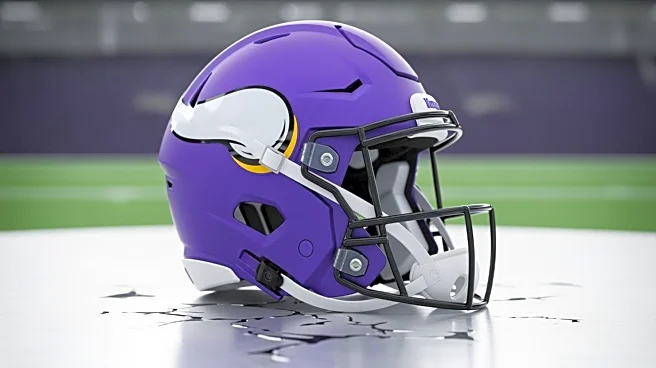What's Happening?
The Minnesota Vikings have announced Carson Wentz as the starting quarterback for their upcoming game against the Philadelphia Eagles, due to JJ McCarthy's ongoing recovery from a high-ankle sprain. McCarthy,
who was injured in Week 2, has not participated in practice leading up to the Week 7 game, prompting head coach Kevin O'Connell to make the decision. McCarthy will serve as the emergency third quarterback, while Max Brosmer will be the immediate backup. The Vikings, currently holding a 3-2 record, are exercising caution with McCarthy, who was their No. 10 pick in the 2024 NFL Draft and is seen as a key player for the team's future.
Why It's Important?
This decision is significant for the Vikings as they navigate the season with a focus on long-term strategy. JJ McCarthy is considered a vital asset for the team's future, and his health is a priority. Carson Wentz's performance as a starter could influence the team's dynamics, especially with upcoming games, including a Thursday Night Football matchup against the Los Angeles Chargers. The Vikings' approach reflects a balance between immediate performance needs and safeguarding their investment in McCarthy, which could impact their playoff prospects and team morale.
What's Next?
The Vikings face a short week ahead, with a game against the Los Angeles Chargers following the Eagles matchup. Depending on McCarthy's recovery, Wentz may continue as the starter for the next two games. The team's management of McCarthy's injury will be crucial, as it could affect their strategy and performance in the upcoming games. Fans and analysts will be watching Wentz's performance closely, especially given his history with the Eagles, adding an element of personal stakes to the game.
Beyond the Headlines
The decision to start Wentz over McCarthy highlights the complexities of managing player injuries in professional sports. It underscores the importance of strategic planning in team management, balancing immediate game performance with long-term player health and development. This situation also reflects broader themes in sports management, such as investment in player development and the impact of injuries on team dynamics and season outcomes.









